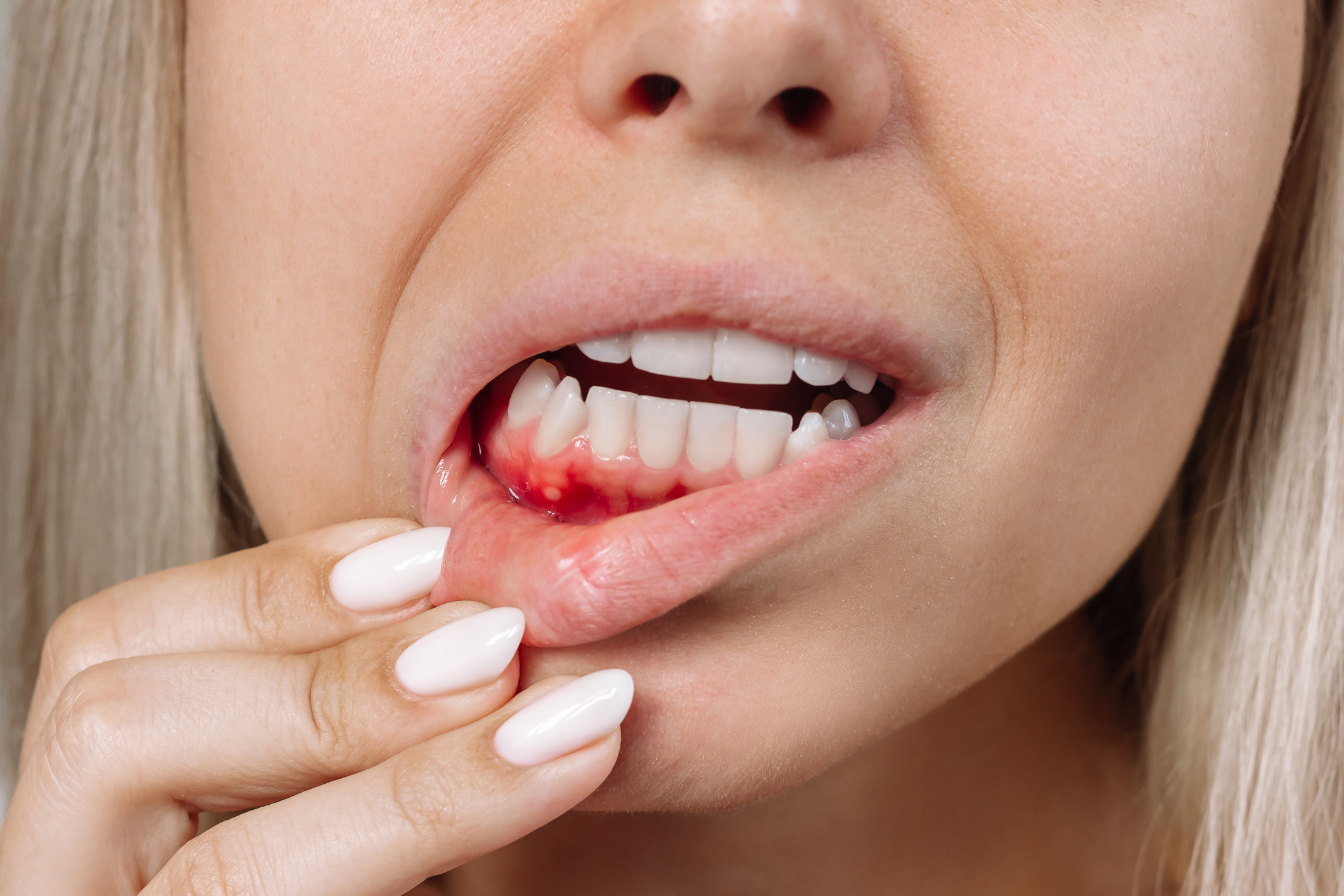Bad breath in pregnancy? Common causes, and 10 dentist-approved tips to deal with it
From hygiene practices to handy bathroom buys, here’s how to ward off bad breath while you’re expecting…


When you’re having to grapple with symptoms like feelings of nausea and difficulty sleeping, it can feel like there’s already enough to deal with when you’re pregnant. Throw bad breath into the mix and it can seem especially unfair.
“It is quite common during pregnancy,” says Dr James Goolnik. “It's often related to hormonal fluctuations, especially in the last two trimesters.” Just like tooth sensitivity, you may experience unexpected changes in your mouth as your body works hard growing a baby.
“However, it's important to remember that while bad breath is often linked to pregnancy, it could also be a sign of a dental issue,” adds Dr Goolnik, of why expectant mothers should have regular dental check-ups to rule out other causes - and is the reason the NHS offers free check-ups and treatment during pregnancy and for 12 months after giving birth.
If you are pregnant, you should follow the usual NHS advice on dental care, and you should always seek personalised advice from a healthcare professional. To support your further, we’ve called on leading dentists to share their expert insight into the triggers for bad breath and how best to deal with it.
What causes bad breath during pregnancy?
Hormonal changes
“Plaque is the sticky film that covers teeth,” explains Dr Sam Jethwa, of the colourless substance - made from saliva and leftover food particles - that contains bacteria. “Its formation is perfectly normal, but it does need to be removed otherwise it can lead to issues such as bad breath - as well as gum disease and cavities.”
Dr Jethwa adds: “Pregnant women are more prone to an exaggerated response to plaque build up, which may be due to hormonal changes.” Indeed, rising levels of oestrogen and progesterone can make gums more susceptible to inflammation and infection from bacterial plaque, risking gum disease - or pregnancy gingivitis - which can trigger bad breath.
Food cravings
“Bad breath can occur as a result of food consumed - for example, garlic or onion - and if the food debris is not properly washed away, then bacteria will form,” explains Dr Jethwa. “However, bad breath following eating should only be temporary until you have brushed and flossed your teeth - or even swilled the mouth with water.” But if you find it is continuing despite all these steps, then it is more likely to be due to hormonal changes or possibly even stomach issues.
GoodtoKnow Newsletter
Parenting advice, hot topics, best buys and family finance tips delivered straight to your inbox.
However, certain pregnancy cravings specifically can cause bad breath to be more prevalent. “Pregnancy often involves more frequent snacking - food on teeth, especially sticky carbs, can cause bacteria and bad breath,” notes Dr Goolnik. “Changes in appetite can alter mouth bacteria, which may cause bad breath.
“It can also be triggered by less meticulous oral hygiene - often if you are feeling tired or sick the last thing you want to do is brush or floss your teeth - and acid reflux or pregnancy heartburn are common pregnancy symptom that may also be to blame.”
Increased blood flow to gums
“The gums may be more sensitive to bacteria during pregnancy, since higher levels of progesterone can increase blood flow to the mouth and gums,” says Dr Jethwa. “This can cause a build-up of plaque and bacteria on the gums.”
In turn, this can risk pregnancy gingivitis - or gum disease. “Bacteria around your teeth and gums trigger a localised inflammation,” explains Dr Goolnik. “This causes increased blood flow, which leads to bad breath.”
Morning sickness
“Vomiting, of course, leave breath smelling bad,” notes Dr Jethwa, who adds that if you have been sick, to not brush straight after as the acids can weaken the enamel. In part, a bad odour may be due to the acidic contents of the stomach passing through the mouth.
“But bad breath is also due to the dehydration that follows being sick,” explains Dr Jethwa. “When your body is dehydrated, it doesn’t produce enough saliva - which is essential for cleaning away the debris in your mouth, reducing the chance of bacteria growing and causing bad breath.
“Saliva is also important for neutralising acids and stopping plaque forming on the teeth, and so the lack of it can affect the acidity levels in the mouth - again contributing to bad odours.” Which is why it’s important to stay adequately hydrated.

10 dentist-approved tips to deal with bad breath in pregnancy
- 1. “My number one advice is no matter how bad you feel, clean your teeth twice a day - even if only for 30 seconds,” says Dr Goolnik. However, the recommended amount of brushing time to aim for is two minutes.
- 2. “In order to maintain healthy teeth and gums, it’s vital to brush with a fluoride toothpaste,” recommends Dr Jethwa.
- 3. “Your toothbrush should clean one tooth at a time,” advises Dr Jethwa. “Focus on each one tooth for around three to five seconds - gently directing your brush along the gum line, tongue and roof of the mouth.”
- 4. “Once you have brushed the outside surface of the tooth, repeat from the inside of the mouth,” advises Dr Jethwa. “So many people do not realise how important this is.”
- 5. “Try and rinse your mouth with water after each snack,” advises Dr Goolnik. “I do not advise mouthwash, as it can kill both the bad and good bacteria.”
- 6. “Use interdental aid at least once a day,” suggests Dr Goolnik. “This can be floss, sticks or a waterpik - regularly disturbing the bacteria will help prevent bad breath.”
- 7. “If you are struggling with sensitive gums, try opting for a soft-bristled toothbrush,” advises Dr Jethwa.
- 8. “Sugar-free chewing gum is great after a meal if you are not able to brush,” recommends Dr Goolnik.
- 9. “I get my pregnant patients to use a tongue scraper once a day, usually at night, to reduce bad breath,” shares Dr Goolnik.
- 10. “See a dentist and hygienist at least once during your pregnancy,” insists Dr Goolnik. Ideally, you would make an appointment once every six months during this time.
When to visit your dentist
Bad breath may be a sign of a more serious underlying issue. “If it lasts all day, not from recent meals - like garlic or curries - you should see your dentist,” says Dr Goolnik. “Additionally, if you have a persistent bad taste or pain in your mouth, it may be an underlying infection or cavity.” He adds that it’s best to get it treated before you give birth.
“You should also seek advice from a dentist if bad breath is a recurring issue and affecting your daily life,” notes Dr Jethwa. “Also, you should seek help if you are finding you have other symptoms alongside bad breath - such as loose teeth, persistently bleeding gums and swollen gums.”
Symptoms of gum disease
“Gingivitis is the term used for gum disease when it is in its early stages, and is very common to see in pregnant women,” says Dr Jethwa. “If not treated, it can eventually lead to periodontitis, which can cause teeth to become loose and fall out.” Signs you might be suffering, and for which you should seek professional advice, include:
- Bad breath, due to the build-up of plaque and bacteria on the gums
- Bleeding gums, more likely to bleed when brushing or flossing
- Swollen gums that may also be sore
- Pain on chewing
- Loose teeth
“Early intervention is key to stopping gum disease and its complications,” insists Dr Goolnik. “They can include tooth loss, because as the disease progresses, it deteriorates the bone supporting your teeth. Additionally, it may raise the risk of heart disease, stroke and dementia.
“Severe gum disease in pregnant women is also linked to premature birth and low birth weight, while there is a direct link between gum disease and diabetes complications - since it can make it more difficult to control blood sugar levels.”

Frequently asked questions
Is bad breath during pregnancy a sign of a boy or girl?
There is no truth to the myth that bad breath can indicate the gender of a baby, insist our experts. The only way to tell if you’re having a boy or girl during pregnancy is through an ultrasound scan.
Why does my mouth taste funny during pregnancy?
“It's common for pregnant women to have taste changes,” says Dr Goolnik, of the unusual side effect of hormonal changes. “The most common is a bitter or metallic taste, which can lead to strange cravings for foods - the good news is your taste fully returns once you have given birth.”
When does bad breath in pregnancy start?
“Bad breath can be common during pregnancy for a variety of reasons, such as hormonal changes, dehydration, morning sickness, unusual food cravings and lifestyle changes,” says Dr Jethwa. “It can start as early as the first trimester, and usually corrects itself once the baby is born.”
We spoke to the following experts

Dr James Goolnik is a London-based dentist and author of cookbook, Kick Sugar, which aims to help people reduce sugar in their diets. He qualified from King’s College Dental School, and is now studying for a diploma in functional nutrition with the Institute of Optimal Nutrition.

Dr Sam Jethwa is a cosmetic dentist and founder of Bespoke Smile. He is the president elect of the British Academy of Cosmetic Dentistry and also a qualified clinical teacher after completing a postgraduate diploma in clinical education from the Royal College of Surgeons and Physicians of Glasgow.

Lauren is a freelance writer and editor, with more than eight years of experience working in digital and print journalism. She has penned news and features for titles including Women's Health, Daily Telegraph, Cosmopolitan, The Times, Stylist, The Guardian, Woman & Home, Dazed, The Sun's Fabulous, Yahoo UK and Grazia.
Lauren specialises in covering health and wellness topics—ranging from nutrition and fitness, to health conditions and mental wellbeing. She also runs a weekly newsletter called Well, Actually..., which has been named a Substack Featured Publication.